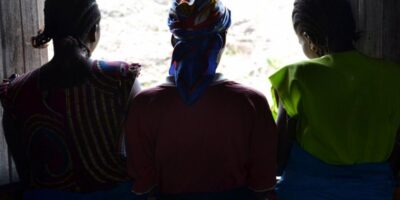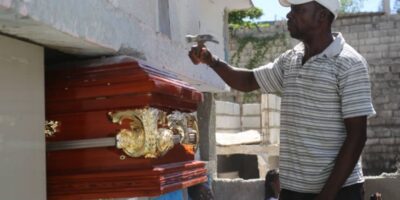In recent years, the dry and rainy seasons have been occurring with disconcerting irregularity, seriously affecting the planning of the agricultural calendar nationwide
Climate change, which is amplifying natural disasters, is hitting Haiti hard against a backdrop of low funding for the country’s resilience and adaptation capacities, according to experts contacted by AyiboPost.
Between 2001 and 2008, violent storms led to agricultural losses estimated at 101 million US dollars. In 2016, Hurricane Matthew devastated the Southern region of the country, causing enormous losses estimated at nearly 38 billion gourdes, according to an assessment report from the Ministry of Agriculture. This situation tends to worsen with each passing year.
However, international funding is lacking to combat the effects of climate change on the agricultural sector, according to specialists. « Haiti must be able to develop strategies for local financing, » analyzes agronomist Christin Calixte, a former official of the Ministry of Agriculture, with a master’s degree in environmental management.
Between 2001 and 2008, violent storms led to agricultural losses estimated at 101 million US dollars.
Read also: El Niño attaque les paysans en Haïti
Climate change is causing a gradual increase in the average global temperature.
« Haiti is already experiencing the full impact of climate change, » says David Noncent, a doctor in climate studies and a researcher with the climate change research team at Quisqueya University.
While specialists believe that Haiti’s geographical position in the Caribbean basin bestows it with great biodiversity, this same position also puts it in the path of terrible natural disasters, notably cyclones, storms, floods, droughts and increasingly unpredictable and devastating tropical hurricanes. A situation that climate disruption is constantly worsening.
In recent years, dry and rainy spells have been occurring with disconcerting irregularity, seriously affecting the planning of the agricultural calendar nationwide, with considerable impacts on rain-fed crops such as corn and beans.
« With climate change, we are witnessing an alternation of extremes, » says David Noncent.
While specialists believe that Haiti’s geographical location in the Caribbean basin gives it great biodiversity, this same position also puts it in the path of terrible natural disasters.
Indeed, heatwaves can be followed by violent tropical hurricanes, causing floods and enormous losses.
« The agricultural sector is the most vulnerable sector to climate change, » says Raoul Vital, director of the National Observatory for Environmental Quality and Vulnerability at the Ministry of the Environment. « The weather conditions intensified by climate change have deeply disrupted Haitian agriculture, which relies heavily on precipitation, » he adds.
In the Artibonite Valley, thousands of farmers are struggling due to water shortages for irrigating their lands. This situation has led to the abandonment of several dozens of hectares of arable land, while Haiti is facing an acute food crisis.
Due to lack of water, plants dry up and do not bear fruit. Animals no longer produce as many litters as they did before.
Research conducted as part of David Noncent’s doctoral thesis has shown a trend towards increasingly frequent dry periods in Haiti in the years to come, posing a great danger to livestock and certain crops.
In 2012, the United Nations Development Programme predicted a 6 to 20% decrease in the amount of rainfall in the country, an increase in the average temperature of 0.8 to 1°C by 2030, and a rise in the average sea level of 0.5 to 0.7 meters during the same period. These events are likely to endanger an area of more than 21,000 hectares of irrigated agricultural land in various coastal areas, including the departments of Nippes, Artibonite, and Nord-Ouest.
Read also: L’urgence du changement climatique en photos à la Villa Kalewès
Soil salinization of cultivable land due to the flooding of coastal areas by seawater is one of the major threats that the Haitian agricultural sector will have to face. According to the 2006 National Adaptation Plan developed by the Ministry of Agriculture, more than 38,463 hectares of land, 63% of which is located in Artibonite, is threatened by salinization. A study by Quisqueya University highlights the communes of L’Estère, Grande Saline, Saint-Marc, and Desdunes among the most affected by salinization. This is already affecting maize, rice, and bean crops in the valley, according to the same study.
Coffee and millet should be added to the list of crops affected by climate change.
A study by Quisqueya University highlights the communes of L’Estère, Grande Saline, Saint-Marc, and Desdunes among the most affected by salinization.
If strategic documents such as the National Adaptation Plan have been developed by Haiti to establish priority areas in its fight against climate change, it is nevertheless fair to question their implementation due to issues related to, among other things, good governance and difficulties in finding funding.
Raoul Vital acknowledges the urgency for Haiti to adapt to climate change. However, he says, « a small island state like Haiti cannot adapt without adequate financial and technical means. »
Read also: Le parc « La Visite » illustre la guerre ouverte contre les forêts en Haïti
Producing only 0.3 tonnes of carbon dioxide per capita, according to the World Bank, Haiti is nevertheless one of the countries most affected by climate change. Some experts speak of climate injustice by polluting industrial countries such as the United States, France, or Canada towards polluted countries in light of these facts.
In this context, various funds, including the Green Climate Fund, a financing mechanism of the United Nations, have been established. The objective of this initiative is to raise 100 billion US dollars annually to help affected countries cope with climate change.
However, access to these funds remains a huge challenge for eligible countries, including Haiti.
« The complexity of the procedures required to access these funds makes the task difficult for countries, » analyzes agronomist engineer Christin Calixte.
Some experts speak of climate injustice by polluting industrial countries such as the United States, France, or Canada towards polluted countries in light of this observation.
However, one cannot ignore the international context marked by war, migration issues, and the post-Covid-19 economic recession, which have put major contributing countries in great difficulty, he adds.
Read also: Les conséquences inattendues de la guerre en Ukraine sur Haïti
It is also necessary to take into account the requirements for good governance and transparency to access these funds, which « puts Haiti in a very bad position, » says Calixte.
To address these weaknesses, some of the funding received by Haiti, including the Green Climate Fund, is required to go through UN agencies rather than Haitian authorities.
In May 2023, for the first time in its history, Haiti was among the 7 countries in the world with the most acute food insecurity, according to the latest FAO report. Climate change, which exacerbates existing development problems, is one of the main causes explaining this situation.
In May 2023, for the first time in its history, Haiti was among the 7 countries in the world with the most acute food insecurity
In this context of acute food crisis and difficulty in finding international aid, it is of paramount importance that Haiti begins to develop local financing strategies involving the state and the private sector to address the effects of climate change. It is also crucial for the country to adopt good practices in management, governance, and transparency in the use of funds, concludes Calixte.
English translation by Sarah Jean.
Cover image: Farmers in Léogâne (West) collect water from a spring surrounded by a tire, illustrating the daily struggle for access to clean water. | © Minustah
Watch our meeting with the managers of Forêt des Pins in 2021, discussing the importance of this ecological treasure in Haiti:
Stay in touch with AyiboPost through :
► Our WhatsApp channel : click here
► Our WhatsApp Community : click here
► Our Telegram canal : click here







Comments